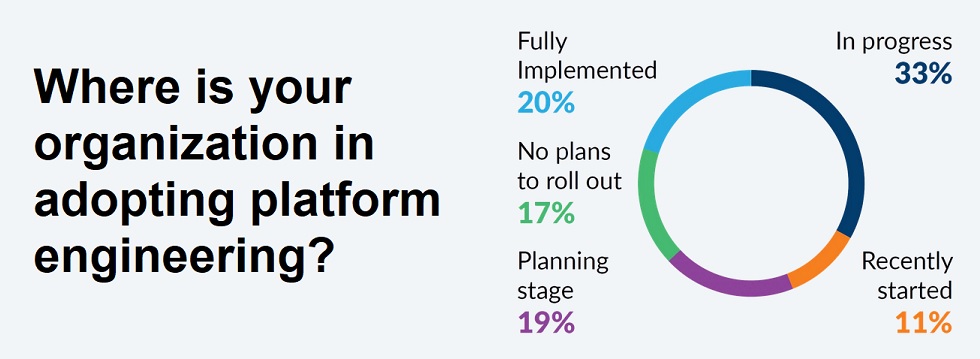GitLab announced the general availability of GitLab Duo with Amazon Q.
Platform engineering is quickly gaining traction within IT organizations, becoming an established practice for software development teams — 83% of respondents have either fully implemented platform engineering or are in some phase of implementation, according to Platform Engineering in 2023: Rapid Adoption and Impact, a new report from CloudBees.
Platform engineering is the discipline of designing and building internal developer platforms (IDPs), toolchains, and workflows that enable self-service capabilities for software engineering teams.
IT leaders are being continuously challenged to do more with less. According to various research studies, developers spend as little as 12.5% to 30% of their time per week writing code. This is driving IT and DevOps leaders to urgently find new ways to enhance developer productivity. Platform engineering has come to the forefront due to its ability to establish best practices for improving developer productivity and developer experience (DevEx). Platform engineering practices have already demonstrated success in shifting significant workload away from developers.
Data from the survey shows significant levels of platform engineering adoption or planned adoption (83%), with:
■ 20% fully implemented
■ 33% in progress
■ 11% recently started
■ 19% in the planning stages
Only 17% of respondents say they have no plans to roll out platform engineering.

The top five drivers of platform engineering each account for approximately 20% of responses and illustrate the critical and broad benefits of platform engineering for developers and DevOps teams. Drivers for adoption include:
■ Developer productivity (21%)
■ Continuous integration and continuous delivery (CI/CD) pipeline implementation (20%)
■ Standardization of tools and processes (20%)
■ Security enhancements (20%)
■ Infrastructure as code (19%)
Business Impact
As DevOps boomed over the last 10 years, platform engineering's rise to prominence was often attributed to the "We forgot about the developers!" phenomenon. Many things shifted left during the rise of DevOps, further burdening developers and serving as a distraction from coding and creating new innovation. Organizations invest in platform engineering to address multiple needs.
Aligned with the focus on developer productivity, three of the top five use cases for platform engineering are:
■ Management of development, test and production environments (22%)
■ CI/CD pipeline management (21%)
■ Developer Platform as a Service (18%)
Objectives and success measures
Virtually all of the platform engineering objectives rated most important relate to DevEx and improving productivity for developers. The three most highly-ranked objectives are:
■ Self-service for developers (29%)
■ Easy adoption (25%)
■ Meeting developer needs (20%)
The measures of success for platform engineering teams include:
■ Developer productivity (23%)
■ Internal KPI attainment (19%)
■ Cost control (16%)
■ Reigning in tool sprawl (13%)
Finally, the survey shows that platform engineering's home within an organization varies, but it is most commonly placed within:
■ Cloud engineering (30%)
■ Infrastructure groups (25%)
■ Development (20%)
■ Shared services (13%)
■ Operations (13%)
"Far from replacing DevOps, platform engineering has gained its own focus and set of engineering disciplines that are complementary to DevOps," said Sacha Labourey, Chief Strategy Officer, CloudBees. "The survey data shows that platform engineering is being widely adopted and is seen by many organizations as a key element in efforts to maximize efficiencies for software development."
Industry News
Perforce Software and Liquibase announced a strategic partnership to enhance secure and compliant database change management for DevOps teams.
Spacelift announced the launch of Saturnhead AI — an enterprise-grade AI assistant that slashes DevOps troubleshooting time by transforming complex infrastructure logs into clear, actionable explanations.
CodeSecure and FOSSA announced a strategic partnership and native product integration that enables organizations to eliminate security blindspots associated with both third party and open source code.
Bauplan, a Python-first serverless data platform that transforms complex infrastructure processes into a few lines of code over data lakes, announced its launch with $7.5 million in seed funding.
Perforce Software announced the launch of the Kafka Service Bundle, a new offering that provides enterprises with managed open source Apache Kafka at a fraction of the cost of traditional managed providers.
LambdaTest announced the launch of the HyperExecute MCP Server, an enhancement to its AI-native test orchestration platform, HyperExecute.
Cloudflare announced Workers VPC and Workers VPC Private Link, new solutions that enable developers to build secure, global cross-cloud applications on Cloudflare Workers.
Nutrient announced a significant expansion of its cloud-based services, as well as a series of updates to its SDK products, aimed at enhancing the developer experience by allowing developers to build, scale, and innovate with less friction.
Check Point® Software Technologies Ltd.(link is external) announced that its Infinity Platform has been named the top-ranked AI-powered cyber security platform in the 2025 Miercom Assessment.
Orca Security announced the Orca Bitbucket App, a cloud-native seamless integration for scanning Bitbucket Repositories.
The Live API for Gemini models is now in Preview, enabling developers to start building and testing more robust, scalable applications with significantly higher rate limits.
Backslash Security(link is external) announced significant adoption of the Backslash App Graph, the industry’s first dynamic digital twin for application code.
SmartBear launched API Hub for Test, a new capability within the company’s API Hub, powered by Swagger.
Akamai Technologies introduced App & API Protector Hybrid.













